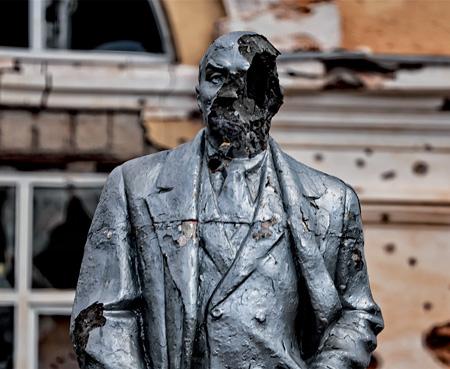
Lyubov Antipova last spoke to her elderly parents more than two weeks ago, when she first heard rumours of a Ukrainian incursion, and begged them to leave their village in Russia's Kursk region.
The threat seemed unreal - Russian soil had not seen invading forces since the end of the second world war - and Russian state media initially dismissed the invasion as a one-off "attempt at infiltration", so Antipova's parents, who keep chickens and a pig on a small plot, decided to stay in Zaoleshenka.
The next day, Antipova saw photographs online of Ukrainian soldiers posing next to a supermarket and the office of a gas company. She recognised the place immediately: her parents live about 50 metres away.
"All those years my parents didn't think they would be affected," Antipova told the Observer by phone from Kursk, carefully avoiding using the word "war", which has been officially outlawed in Russia. "We were sure the Russian army would protect us. I'm amazed how quickly the Ukrainian forces advanced."
Ukraine's incursion into Russia has laid bare the apparent complacency of Russian officials in charge of the border. Many local people accuse the government of downplaying the Ukrainian attack or misinforming them of the danger.
Bu hikaye The Guardian Weekly dergisinin August 23, 2024 sayısından alınmıştır.
Start your 7-day Magzter GOLD free trial to access thousands of curated premium stories, and 9,000+ magazines and newspapers.
Already a subscriber ? Giriş Yap
Bu hikaye The Guardian Weekly dergisinin August 23, 2024 sayısından alınmıştır.
Start your 7-day Magzter GOLD free trial to access thousands of curated premium stories, and 9,000+ magazines and newspapers.
Already a subscriber? Giriş Yap

We're making a music video-but I can't play, or even act
I am in a lifeboat station on the south coast, standing beneath the stern of a rescue vessel, wearing a borrowed fisherman's jumper and holding a banjo. There are lights on me, and I am very much at sea.

BOOKS OF THE MONTH
The best translated fiction

Village people A chilly tone of doom infects these unsettling folk tales, following a settlement from the deep past to near future
The quintessential \"bad place\" is one of the staples of horror fiction. For Stephen King, the bad place - think the Overlook Hotel in The Shining - usually acts as a repository for a long-forgotten evil or injustice to resurface.

A labour of love Haruki Murakami revisits a hypnotic city of dreams and a tale of teen sweethearts, in material he's worked on over four decades
The elegiac quality of Haruki Murakami's new novel, his first in six years, was perhaps inevitable considering its origins. The City and Its Uncertain Walls began as an attempt to rework a 1980 story of the same title, originally published in the Japanese magazine Bungakukai, which Murakami, unsatisfied, never allowed to be republished or translated.

Leading questions The former German chancellor slights her enemies by barely mentioning them-and is frustratingly opaque on her own big calls
Towards the end of her 16-year tenure, former German chancellor Angela Merkel was garlanded with superlative titles: the \"queen of Europe\", the \"most powerful woman in the world\".

Double vision
Is the pay really that good? Do you get bored? We ask 'David Brent', 'Nessa' and 'Ali G' what it's like to make money as the lookalike of a comic creation

Robopop Teen star who does not exist
Miku is a 'Vocaloid' -a holographic avatar that represents a digital bank of vocal samples-performing sellout tours for thousands of very real mega-fans

The show must go wrong
How did a farce about a gaffe-filled amateur dramatic whodunnit become one of Britain's greatest ever exports, the toast of dozens of countries?

Europe's latest radical populist typifies a swing on the continent
Politics in Romania can be a bloody business, especially on the right. The excesses of the Iron Guard, an insurrectionary, violently antisemitic, ultranationalist 1930s political-religious militia, stood out even at a time when fascist parties were wreaking havoc in Germany, Italy and Spain. Given what is happening in Europe today, the events of that period are instructive.

It's high time to tax cannabis and fix French finances
France might not be broke, but the state of its public finances is, well, definitely not good. Total debt stands at €3.2tn ($3.4tn) - 112% of GDP. Interest payments on that debt are the second largest public expenditure after education (which includes everything from crêche, or preschool, to universities) and are higher than the amount spent on defence. And this year's budget deficit is projected to be 6%, three points above the EU's 3% limit.